新视野大学英语 第三版 book unit A教案
- 格式:pdf
- 大小:503.37 KB
- 文档页数:11
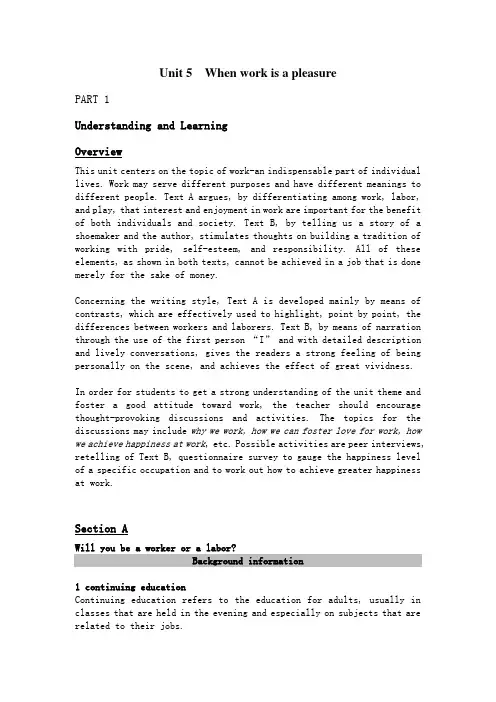
Unit 5 When work is a pleasurePART 1Understanding and LearningOverviewThis unit centers on the topic of work-an indispensable part of individual lives. Work may serve different purposes and have different meanings to different people. Text A argues, by differentiating among work, labor, and play, that interest and enjoyment in work are important for the benefit of both individuals and society. Text B, by telling us a story of a shoemaker and the author, stimulates thoughts on building a tradition of working with pride, self-esteem, and responsibility. All of these elements, as shown in both texts, cannot be achieved in a job that is done merely for the sake of money.Concerning the writing style, Text A is developed mainly by means of contrasts, which are effectively used to highlight, point by point, the differences between workers and laborers. Text B, by means of narration through the use of the first person “I” and with detailed description and lively conversations, gives the readers a strong feeling of being personally on the scene, and achieves the effect of great vividness.In order for students to get a strong understanding of the unit theme and foster a good attitude toward work, the teacher should encourage thought-provoking discussions and activities. The topics for the discussions may include why we work, how we can foster love for work, how we achieve happiness at work, etc. Possible activities are peer interviews, retelling of Text B, questionnaire survey to gauge the happiness level of a specific occupation and to work out how to achieve greater happiness at work.Section AWill you be a worker or a labor?Background information1 continuing educationContinuing education refers to the education for adults, usually in classes that are held in the evening and especially on subjects that are related to their jobs.2 experiential learningExperiential learning is the process of making meaning from direct experience. It is learning through reflection on doing, which is often contrasted with rote learning (死记硬背). Experiential learning focuses on the learning process for the individua1. An example of experiential learning is going to the zoo and learning through observation and interaction with the zoo environment, as opposed to reading about animals from a book. Thus, one makes discoveries and experiments with knowledge firsthand, instead of hearing or reading about others’ experiences.Detailed study of the text1 In a society where slavery in the strict sense has been abolished, the social indications around work, the value of work and the salary, have degraded many laborers into modern slaves-“wage slaves”.(Para. 1)Meaning: In a society where slavery, strictly speaking, has been put to an end, the social status of work, the value of work and the salary, have made many laborers become modern slaves-“wage slaves”.★ degrade:vt. treat sb. without respect and make them lose respect for themselves贬低(某人 );羞辱 (某人)The examination supervisor warned students not to degrade themselves by cheating on the exam.监考老师警告学生不要在考试中舞弊,以免自取其辱。
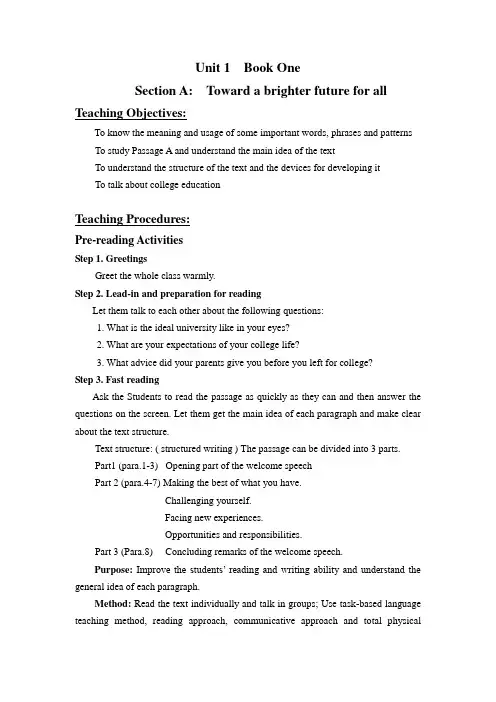
Unit 1 Book OneSection A: Toward a brighter future for all Teaching Objectives:To know the meaning and usage of some important words, phrases and patterns To study Passage A and understand the main idea of the textTo understand the structure of the text and the devices for developing itTo talk about college educationTeaching Procedures:Pre-reading ActivitiesStep 1. GreetingsGreet the whole class warmly.Step 2. Lead-in and preparation for readingLet them talk to each other about the following questions:1. What is the ideal university like in your eyes?2. What are your expectations of your college life?3. What advice did your parents give you before you left for college?Step 3. Fast readingAsk the Students to read the passage as quickly as they can and then answer the questions on the screen. Let them get the main idea of each paragraph and make clear about the text structure.Text structure: ( structured writing ) The passage can be divided into 3 parts.Part1 (para.1-3) Opening part of the welcome speechPart 2 (para.4-7) Making the best of what you have.Challenging yourself.Facing new experiences.Opportunities and responsibilities.Part 3 (Para.8) Concluding remarks of the welcome speech.Purpose: Improve the students’ reading and writing ability and understand the general idea of each paragraph.Method: Read the text individually and talk in groups; Use task-based language teaching method, reading approach, communicative approach and total physicalresponse method.Step 4. Preparation for details of the text on the screenStudents are required to look at the Words and Phrases on the screen and give a brief presentation in class.Words and Phrases:Purpose: Train the Students’ ability of unde rstanding and using foreign language.Method:Talk in groups, Use task-based language teaching method, communicative approach and total physical response method.1. (Para.1)pledge to do sth. 作保证,承诺China and the United states pledge to boost cooperation and exchange to ensure a better future for China-US ties.中美政府承诺将加强合作与交流以确保两国关系的未来更加美好。
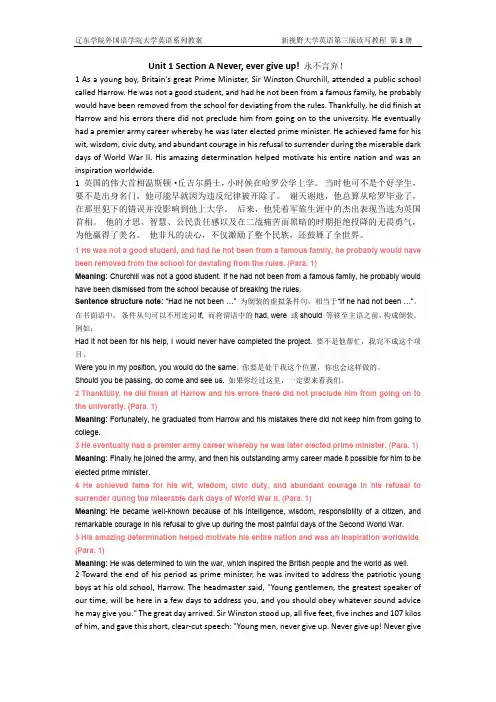
Unit 1 Section A Never, ever give up!永不言弃!1 As a young boy, Britain's great Prime Minister, Sir Winston Churchill, attended a public school called Harrow. He was not a good student, and had he not been from a famous family, he probably would have been removed from the school for deviating from the rules. Thankfully, he did finish at Harrow and his errors there did not preclude him from going on to the university. He eventually had a premier army career whereby he was later elected prime minister. He achieved fame for his wit, wisdom, civic duty, and abundant courage in his refusal to surrender during the miserable dark days of World War II. His amazing determination helped motivate his entire nation and was an inspiration worldwide.1 英国的伟大首相温斯顿·丘吉尔爵士,小时候在哈罗公学上学。
当时他可不是个好学生,要不是出身名门,他可能早就因为违反纪律被开除了。
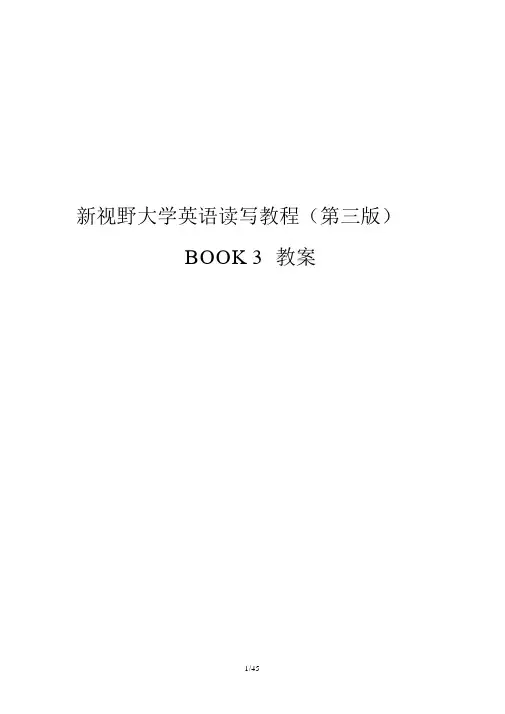
新视野大学英语读写教程(第三版)BOOK 3 教案章节Unit One: The Way to SuccessSection A: New Words and Expressions教案内容Text: Never, ever give up!Exercises: Vocabulary, Sentence Structure,Translation Listening, Speaking & Writing Skills教案目的1.To talk about the secret of success。
2. To further understand the text。
3.To apply the phrases and patterns。
4.To master the essay writing skill。
1. Clearly know the structure of the passage。
2. Master the important language points。
教案要求3.Briefly summarize the passage alone。
4.Correctly use and master the key words in this unit.重点难点1.The structure of the whole passagediscussed and the writing waysmentioned in this passage2.The reading skills mentioned in this unit3.listening practicing related to the contents learned in this unit1.The use of the new words and phrases in this passage2.The writing ways mentioned in this passage3.Some important sentence structures课堂设计Step 1: Lead-in10m Questioning&The Discussing Questioning&First Step 2: Pre-reading Activities10m DiscussingTwoLecturing,PeriodsStep 3: New Words80m Questioning&Giving Examples The Step 1: Background Information10m Questioning& Second DiscussingTwo Step 2: Structure Analysis10m LecturingPeriodsLecturing, Step 3: Language points and Difficult70m Questioning&SentencesGiving ExamplesStep 4: Comprehension of the Text A10m Questioning&DiscussingStep 1: Summarize the passage orally20m Questioning& DiscussingTheStep 2:Exercises (Words in use, WordThird Questioning& building,Banked cloze, Expressions in use,70mTwoTranslation in Section A)DiscussingPeriodsLecturing, Step 3: Revision & Homework10m QuestioningStep 1: Check Homework30m QuestioningTheStep 2:Structured Writing30m Watching &Forth DiscussingTwoStep 3: Listening20m Listening &Periods QuestioningStep 4: Speaking20m Questioning & Discussing教学过程The First Two Periods:Step 1: Lead-in:1.What is success?2.What do you think are the secrets of success?Step 2: Pre-reading Activities:1. Listen to a talk about steps to make your dreams come true. Fill in the blanksbased on what you hear.2. Listen to the talk again and discuss the following questions.Step 3: New WordsThe Second Two Periods:Step 1: Background Information1. Public schools in the UK & US2. Winston ChurchillStep 2: Structure AnalysisPart I (Paras.1-2): By using Winston Churchill’ s story and his speech at Harrow as anintroduction to the topic, the text makes clear its statement: thesecret of success is“ Never give up”.Part II (Paras.3-7): Through the examples of world famous scientists, statesman, andjurist, the text brings forward the statement that only those with astrong will , those who“ keep their eyes on the prize” , and those whoexpend the substantial effort to keep going, will finally succeed.Part III (Paras 8): By reinforcing the statement given in part II, the text draws theconclusion that with hard work, determination, dedication andpreparation, you can transcend any handicap, accomplish any feat,and achieve success.Step 3: Language points and Difficult SentencesPractical Phrases1. deviate from ⋯偏离,背离⋯⋯2. preclude sb. from doing阻止某⋯人做⋯⋯3. triumph over战胜⋯⋯⋯4. in (the) pursuit of追⋯求⋯⋯5. work one’ s 。
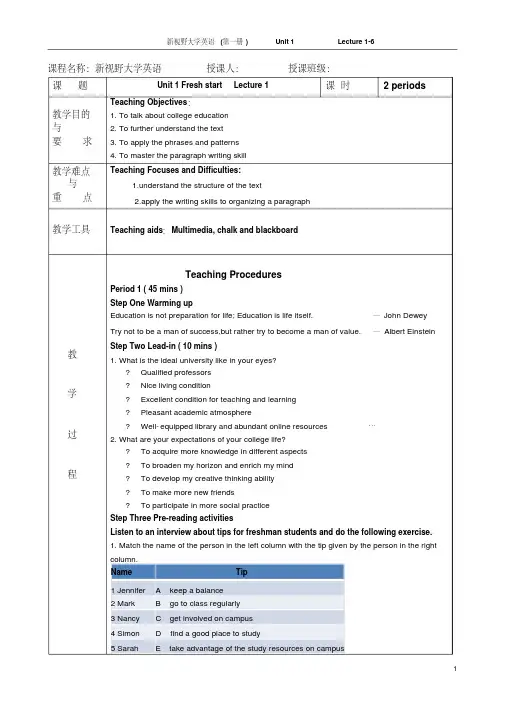
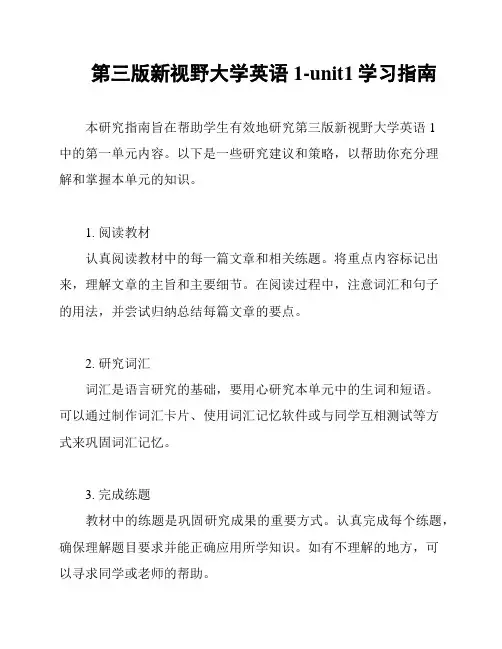
第三版新视野大学英语1-unit1学习指南本研究指南旨在帮助学生有效地研究第三版新视野大学英语1中的第一单元内容。
以下是一些研究建议和策略,以帮助你充分理解和掌握本单元的知识。
1. 阅读教材认真阅读教材中的每一篇文章和相关练题。
将重点内容标记出来,理解文章的主旨和主要细节。
在阅读过程中,注意词汇和句子的用法,并尝试归纳总结每篇文章的要点。
2. 研究词汇词汇是语言研究的基础,要用心研究本单元中的生词和短语。
可以通过制作词汇卡片、使用词汇记忆软件或与同学互相测试等方式来巩固词汇记忆。
3. 完成练题教材中的练题是巩固研究成果的重要方式。
认真完成每个练题,确保理解题目要求并能正确应用所学知识。
如有不理解的地方,可以寻求同学或老师的帮助。
4. 参与课堂讨论积极参与课堂讨论可以加深对研究内容的理解。
在课堂上,发表自己的观点、提出问题,并与同学互动交流。
这不仅可以加深自己的理解,还可以从他人的观点中获得新的启发。
5. 制定研究计划制定一个合理的研究计划,安排每天的研究时间。
将研究分成小块,每块专注于一项任务或目标。
遵守研究计划,并保持持续的研究动力。
6. 多种方式研究除了课本研究,还可以通过听英语广播、看英语电影和听英语歌曲等方式来提升英语听力和口语能力。
多种方式的研究可以使你的语言技能得到全面提高。
记住,学习是一个持续的过程,需要坚持和努力。
通过以上的学习建议和策略,相信你能够在第一单元中取得良好的学习效果。
祝你学习顺利!。
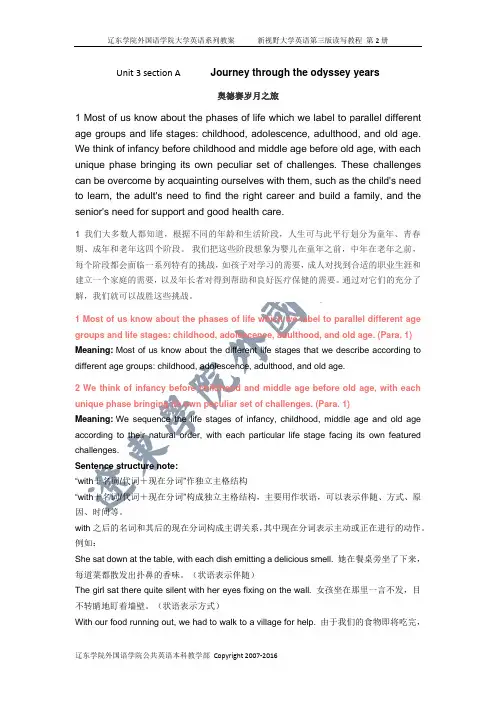
Unit 3 section A Journey through the odyssey years奥德赛岁月之旅1 Most of us know about the phases of life which we label to parallel different age groups and life stages: childhood, adolescence, adulthood, and old age. We think of infancy before childhood and middle age before old age, with each unique phase bringing its own peculiar set of challenges. These challenges can be overcome by acquainting ourselves with them, such as the child's need to learn, the adult's need to find the right career and build a family, and the senior's need for support and good health care.1 我们大多数人都知道,根据不同的年龄和生活阶段,人生可与此平行划分为童年、青春期、成年和老年这四个阶段。
我们把这些阶段想象为婴儿在童年之前,中年在老年之前,每个阶段都会面临一系列特有的挑战,如孩子对学习的需要,成人对找到合适的职业生涯和建立一个家庭的需要,以及年长者对得到帮助和良好医疗保健的需要。
通过对它们的充分了解,我们就可以战胜这些挑战。
1 Most of us know about the phases of life which we label to parallel different age groups and life stages: childhood, adolescence, adulthood, and old age. (Para. 1) Meaning: Most of us know about the different life stages that we describe according to different age groups: childhood, adolescence, adulthood, and old age.2 We think of infancy before childhood and middle age before old age, with each unique phase bringing its own peculiar set of challenges. (Para. 1)Meaning: We sequence the life stages of infancy, childhood, middle age and old age according to their natural order, with each particular life stage facing its own featured challenges.Sentence structure note:“with+名词/代词+现在分词”作独立主格结构“with+名词/代词+现在分词”构成独立主格结构,主要用作状语,可以表示伴随、方式、原因、时间等。
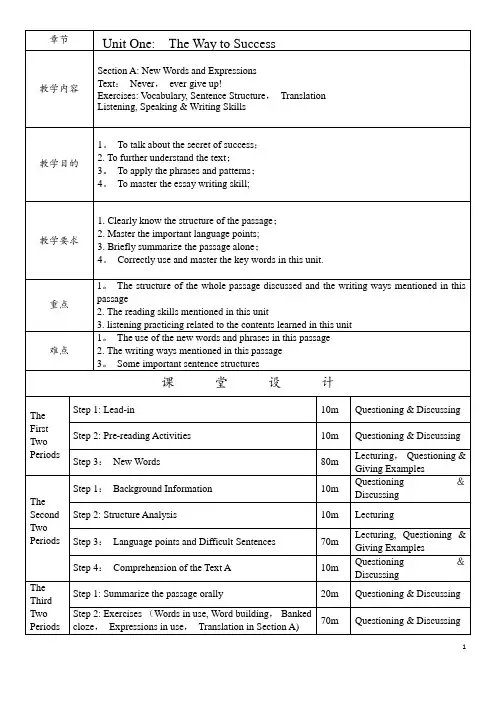
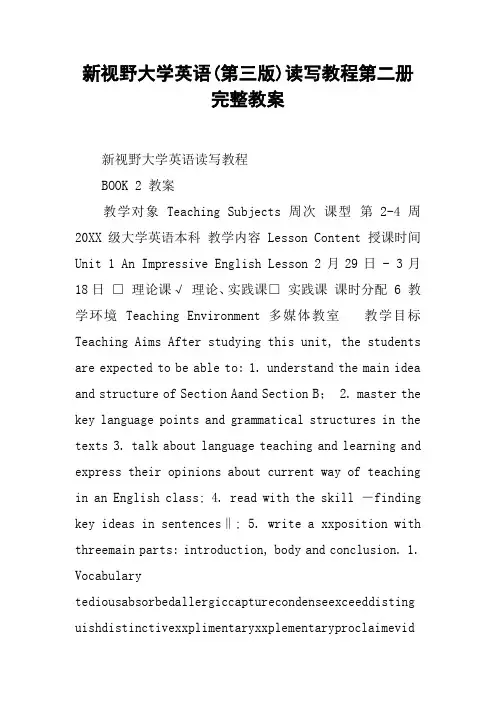
新视野大学英语(第三版)读写教程第二册完整教案新视野大学英语读写教程BOOK 2 教案教学对象 Teaching Subjects 周次课型第2-4周20XX级大学英语本科教学内容 Lesson Content 授课时间Unit 1 An Impressive English Lesson 2月29日 - 3月18日□理论课√理论、实践课□实践课课时分配 6 教学环境 Teaching Environment 多媒体教室教学目标Teaching Aims After studying this unit, the students are expected to be able to: 1. understand the main idea and structure of Section Aand Section B; 2. master the key language points and grammatical structures in the texts 3. talk about language teaching and learning and express their opinions about current way of teaching in an English class; 4. read with the skill ―finding key ideas in sentences‖; 5. write a xxposition with threemain parts: introduction, body and conclusion. 1. Vocabulary tediousabsorbedallergiccapturecondenseexceeddisting uishdistinctivexxplimentaryxxplementaryproclaimevidentlyadequatexxpetentadjustbeneficial 2. Skills ●Learn to read with the skill ―finding key ideas in sentences‖and write a xxposition with threemain parts: introduction, body and conclusion. ●To talk about language teaching and learning ●write a xxposition with threemain parts: introduction, body and conclusion. ●To apply the phrases and patterns 重点 Key Issues 难点 PotentialProblems and Difficulties 教学方法Methodology A xxbination of traditional teaching methods with the xxmunicative approach will be adopted. Special attention should be paid to classroom interaction like questioning and answers. Small group works are always needed while discussing the questions and the difficult translation encouragement is needed and more guidance will be givenin their extracurricular study. Visual aids, projector, stereo and microphone 教具 Teaching Aids 教学分组Teaching Groups Group work and pair work 课堂学习任务与活动的组织Conduct of Tasks and Activities Students-centered Task-based teaching and learning 教学过程设计 Teaching Procedures 步骤1Step 1 导入Lead-in warming-up questions discussion. 1. What arethe key factors that help people learn English as a foreign language 2. Do you have any problem in English learning you think grammar is important in English learning II. Listening and discussing. 1. Listening practice. 2. In your opinion, what is the most effective way to learn English III. Listening to a talk and answer questions on page 2 步骤 2Step 2课文学习Section A An Impressive English Lesson I. New words 1. tedious: a. boring and continuing for too long 冗长乏味的 Telling the story has bexxe tedious, as I have done it so many times. 讲述这个故事已变得单调乏味,因为我已经讲了这么多次了。
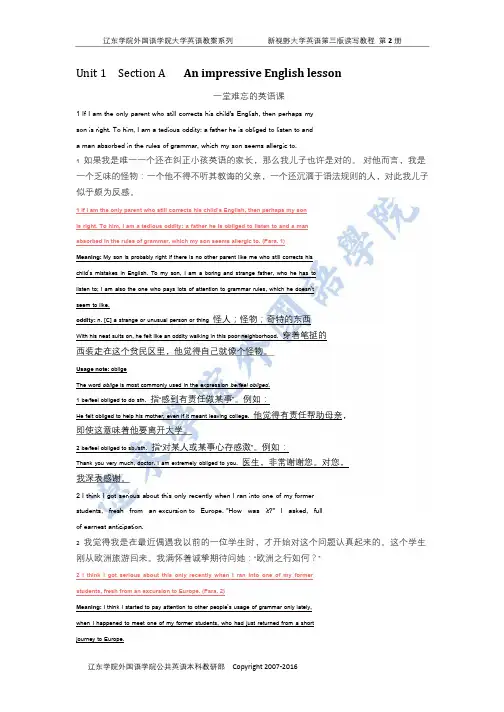
Unit 1 Section A An impressive English lesson一堂难忘的英语课1 If I am the only parent who still corrects his child's English, then perhaps myson is right. To him, I am a tedious oddity: a father he is obliged to listen to anda man absorbed in the rules of grammar, which my son seems allergic to.1 如果我是唯一一个还在纠正小孩英语的家长,那么我儿子也许是对的。
对他而言,我是一个乏味的怪物:一个他不得不听其教诲的父亲,一个还沉湎于语法规则的人,对此我儿子似乎颇为反感。
1 If I am the only parent who still corrects his child’s English, then perhaps my sonis right. To him, I am a tedious oddity: a father he is obliged to listen to and a manabsorbed in the rules of grammar, which my son seems allergic to. (Para. 1)Meaning: My son is probably right if there is no other parent like me who still corrects hischild’s mistakes in English. To my son, I am a boring and strange father, who he has tolisten to; I am also the one who pays lots of attention to grammar rules, which he doesn’tseem to like.oddity: n. [C] a strange or unusual person or thing 怪人;怪物;奇特的东西With his neat suits on, he felt like an oddity walking in this poor neighborhood. 穿着笔挺的西装走在这个贫民区里,他觉得自己就像个怪物。
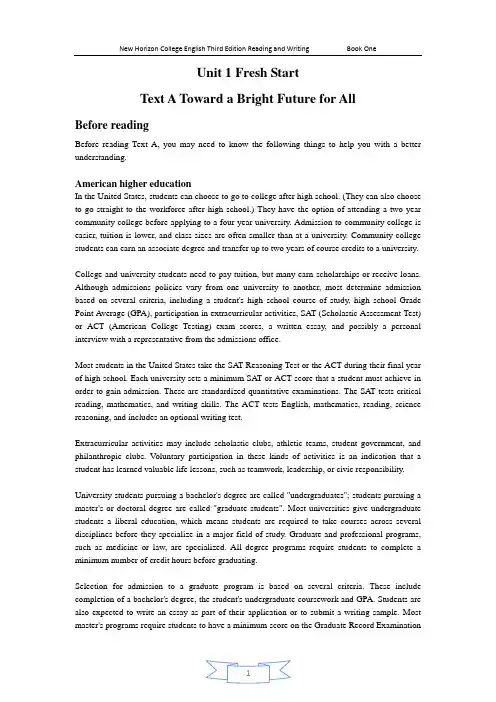
Unit 1 Fresh StartText A Toward a Bright Future for AllBefore readingBefore reading Text A, you may need to know the following things to help you with a better understanding.American higher educationIn the United States, students can choose to go to college after high school. (They can also choose to go straight to the workforce after high school.) They have the option of attending a two-year community college before applying to a four-year university. Admission to community college is easier, tuition is lower, and class sizes are often smaller than at a university. Community college students can earn an associate degree and transfer up to two years of course credits to a university.College and university students need to pay tuition, but many earn scholarships or receive loans. Although admissions policies vary from one university to another, most determine admission based on several criteria, including a student's high school course of study, high school Grade Point Average (GPA), participation in extracurricular activities, SAT (Scholastic Assessment Test) or ACT (American College Testing) exam scores, a written essay, and possibly a personal interview with a representative from the admissions office.Most students in the United States take the SAT Reasoning Test or the ACT during their final year of high school. Each university sets a minimum SAT or ACT score that a student must achieve in order to gain admission. These are standardized quantitative examinations. The SAT tests critical reading, mathematics, and writing skills. The ACT tests English, mathematics, reading, science reasoning, and includes an optional writing test.Extracurricular activities may include scholastic clubs, athletic teams, student government, and philanthropic clubs. V oluntary participation in these kinds of activities is an indication that a student has learned valuable life lessons, such as teamwork, leadership, or civic responsibility.University students pursuing a bachelor's degree are called "undergraduates"; students pursuing a master's or doctoral degree are called "graduate students". Most universities give undergraduate students a liberal education, which means students are required to take courses across several disciplines before they specialize in a major field of study. Graduate and professional programs, such as medicine or law, are specialized. All degree programs require students to complete a minimum number of credit hours before graduating.Selection for admission to a graduate program is based on several criteria. These include completion of a bachelor's degree, the student's undergraduate coursework and GPA. Students are also expected to write an essay as part of their application or to submit a writing sample. Most master's programs require students to have a minimum score on the Graduate Record Examination(GRE), which tests verbal reasoning, quantitative reasoning, critical thinking, and analytical writing skills.Students continue to take courses at the graduate level. A final thesis is required for most master's programs. Doctoral students take courses until they have earned enough credit hours to attempt their qualifying examinations. These are usually taken over several days and often include a written and oral component. After doctoral students pass their qualifying exams, they are advanced to candidacy and can begin writing their dissertation. Before the degree is given, the completed dissertation must be orally defended before the candidate's faculty committee.Vera WangVera Wang (王薇薇, 1949- ) is aChinese-American fashion designer. Shewas born and raised in New York City.While trained as a figure skater in highschool, she eventually earned a degree in arthistory from Sarah Lawrence College in1971. But a career in fashion was her dream.She worked as a senior fashion editorfor Vogue magazine for 15 years. In 1985,she left Vogue and joined Ralph Lauren as adesign director for two years. In 1990, she opened her own design salon in New York, and featured her trademark bridal gowns. Wang has made wedding gowns for many celebrities and public figures, such as Jennifer Lopez (珍妮弗•洛佩兹), Sharon Stone (莎朗•斯通) and Chelsea Clinton (切尔西•克林顿).Detailed study of the textPara.1. Good afternoon! As president of the university, I am proud to welcome you to this university. Your achievement is the triumph of years of hard work, both of your own and of your parents and teachers. Here at the university, we pledge to make your educational experience as rewarding as possible.下午好!作为校长,我非常自豪地欢迎你们来到这所大学。
Unit 1: brighter future for all教学重点:1. The structure of the whole passage discussed and the writing ways mentioned in this passage2. The reading skills mentioned in this unit3. listening practicing related to the contents learned in this unit教学难点:1.Talking about college education.2.Writing paragraphs with the structure “a general statement supported by details”.3.Applying the phrases and patterns.教学过程:1. Warming-up activitiesa. What is the ideal university like in your eyes?b. What are your expectations of your college life?c. Listen to an interview about tips for freshman students and do the following exercise.d. Listen to a short passage concerning college education and fill in the missing information.2. Text studya. Main idea of the partsIn his welcome speech, the president urges students to take advantage of the unique opportunity to face new exciting experience and to challenge themselves so that they will reap the benefits of their college years. The president also expresses the university’s expectations of its students and of the responsibilities they carry.Part I (Para. 1-3): The president congratulates students on their achievement and reminds students of the fact that their current success was due to their own and their par ents’ efforts, and that their future is built on a solid foundation of the past.Part II (Para. 4-7): The president offers students comprehensive advice on how to make the most of their four college years and makes them realize the university’s expectation s and their own responsibilities.Part III (Para. 8): The students are called upon to cherish the opportunity and to bear in mind their responsibilities as citizens of their communities, their country and the world.b. Structure of the text✧Opening part of the welcome speech✧Advice✧Concluding partc. Summary of the text✧Main idea✧Language focusPledge to do sth. : China and the United states pledge to boost cooperation and exchange to ensure a better future for China-US ties.Make the most of sth.: This article introduces 7 tips for making the most of your iPhone5S.Reap the benefits: Keep on reading extensively, and you will reap the benefits sooner or later.Feel overwhelmed by sth.: Nowadays, many young people feel overwhelmed by the fierce competition in the job market.Stand chance of: Animals stand little chance of survival under such extreme weather.Take great pleasure in:He always takes great pleasure in lending a helping hand to people around him.Open the door to sth.: These useful suggestions open the door to better communication with your parents.3. Language applicationa. writing device✧Sentence writingParallelism:By placing two or more ideas of equal value in the same grammatical form enables us to express these ideas clearly and emphatically.Example: You may have cried tears of joy to be finally finished with high school; your parents may have cried tears of joy to be finally finished with doing your laundry!✧Paragraph writing: topic →details→conclusionExample:For you, these next four years will be a time unlike any other.(Topic sentence) Here you are surrounded by great resources: interesting students from all over the country, a learned and caring faculty, a comprehensive library, great sports facilities, and student organizations covering every possible interest from the arts to science, to community service and so on.(Detail 1: What is available to you on campus) You will have the freedom to explore and learn about new subjects. You will learn to get by on very little sleep, meet fascinating people, and pursue new passions. (Detail 2: What you can do) I wantto encourage you to make the most of this unique experience, and to use your energy and enthusiasm to reap the benefits of this opportunity. (Concluding sentence)Activities performed in class:⏹Do you think a university education can change a person’slife? In what way and why?⏹How do you think of those successful people such as BillGates who dropped out of university?⏹What are you going to do at university in order to samplewidely and challenge yourself?Viewing, listening and speakingUnit 1 Traces of the past教学重点:1.talk about past events and their impacts on the present2.discuss in groups the activities you do at weekends and add asmany activities as possible教学难点:1.conduct an interview2.describe an event教学过程:Opening-up1.talk about the activities shown in the pictures2.Work in pairs and compare your answers.Listening to the word1.Ask Ss to watch a podcast to get its general idea and discuss their answers in groups.2.Ask Ss to watch a podcast and fill in the blanks.3.Ask Ss to discuss the following questions based on what they have heard.Questions:1.What did you do last weekend? Did you enjoy it? Why orwhy not?2.What can you learn from Mother Teresa’s words “Ican do nogreat things, only small things with great love”3.What childhood experience did you have that had a greatimpact on your present life?4.Did your parents make you take up a hobby such as playingthe piano, practicing calligraphy or playing table tennis when you were a child? Did you like it at that time? How doyou think about it now?Role-playWork in pairs and role-play one of the following situations by using skills for asking for and giving recommendations Situation 1: seeing a movieSituation 2: going out for dinnerAssignment:Work in groups of four. Share briefly with your group members a recent event you went to, e.g. a festival, a concert, a sports event, an exhibition, a play, a party, or a film.。
Unit 1 Fresh StartSection A Toward a brighter future for allⅠObjectives:Students may be able to:To talk about college educationTo further understand the textTo apply the phrases and patternsTo master the paragraph writing skillⅡTeaching Focus and Difficulties1. understand the structure of the text2. apply the writing skills to organizing a paragraphⅢTeaching aidsMultimedia, chalk and blackboard Warming up activitiesⅣTeaching ProcedureStep 1:Warm-up activitiesUniversity education is a new journey in your life. It is a fresh start. You begin your journey with military training. The freshmen with the green military uniform have become a beautiful scenery line in the universities. Here comes my question:1. Do you think military training is necessary? Why or why not?Pros: It builds our body and confidence. Good heath is the foundation of a meaning life. It also seems to build teamwork among individual classes which is beneficial to our future career. It develops a spirit of discipline in life and help us better obey university rules. Another advantage is that it gives the students a taste of the military life. They have more respect for the men who protect their country, and they may even decide to pursue a military career. It can help shape our character and cultivate a spirit of endurance and willpower. The military drill is very tough, but it provides an opportunity to learn not to give up when faced with difficulties.Cons: military training often takes place in summer. It is too hot and is harmful to the health of students. And some instructors are likely to use physical punishment which leads to hurts in body and soul to students. They say that a short period of training can neither build up the bodies nor strengthen the willpower of college students. They argue that more attention should be paid to the daily exercise and activities. It is a waste of time and we should focus our attention on study.2. What are your expectations of your college life?You can acquire specialized knowledge about your major and develop my creative thinking ability and research skills. You have the opportunities to make more new friends and share ideas with people of different minds. You can gain a broader view of the world by meeting people fro diverse backgrounds and cultures. You can start a journey of self-discovery, self-improvement and self-fulfillment. You can have nice living condition and excellent condition for learning. You can study in a pleasant academic atmosphere. You can participate in more social practice. Well-equipped library and abundant online resources…Step 2. Structure of the textPart 1 (1-3): The president congratulates students on their achievement and reminds students of the fact that their current success was due to their own and their parents’ efforts, and that their future is built on a solid foundation of the past.1Part 2 (4-7) The president offers students comprehensive advice on how to make the most of their four college years and makes them realize the university’s expectations and their own responsibilities.Part 3 (8) The students are called upon to cherish the opportunity and to bear in mind their responsibilities as citizens of their communities, their country and the world.Step3. Details for each part(1) Questions for part 1What can we know from paragraph 1?In paragraph 3, of what did the parents always remind their children before they came to college?What’s the speaker’s purpose in mentioning the parents’ reminders?Language points for part 11. Pledge①make a formal promise The new president pledged to cut taxes and increase employment②n. a serious promise2. pose 摆姿势She is good at posing for photographs.(2) Details for part 2 1. Questions for part 2What great resources will you enjoy?What responsibilities should college students shoulder according to the speaker?Language Points for part 21. comprehendvt.理解,包含comprehensive adj. 有理解力的, 综合的comprehension n. 理解,包含2. facilityleisure facilities 休闲设施3.pursue①追求, 致力于pursue a bachelor’s degree ②chase sb. Or sth.4. overwhelm淹没;压倒be/ feel overwhelmed by不知所措We were overwhelmed by the number of the applicants for this position.这个职位的申请者人数多得让我们不知所措。
Unit 1 Book OneSection A: Toward a brighter future for all Teaching Objectives:To know the meaning and usage of some important words, phrases and patterns To study Passage A and understand the main idea of the textTo understand the structure of the text and the devices for developing itTo talk about college educationTeaching Procedures:Pre-reading ActivitiesStep 1. GreetingsGreet the whole class warmly.Step 2. Lead-in and preparation for readingLet them talk to each other about the following questions:1. What is the ideal university like in your eyes?2. What are your expectations of your college life?3. What advice did your parents give you before you left for college?Step 3. Fast readingAsk the Students to read the passage as quickly as they can and then answer the questions on the screen. Let them get the main idea of each paragraph and make clear about the text structure.Text structure: ( structured writing ) The passage can be divided into 3 parts.Part1 (para.1-3) Opening part of the welcome speechPart 2 (para.4-7) Making the best of what you have.Challenging yourself.Facing new experiences.Opportunities and responsibilities.Part 3 (Para.8) Concluding remarks of the welcome speech.Purpose: Improve the students’ reading and writing ability and understand the general idea of each paragraph.Method: Read the text individually and talk in groups; Use task-based language teaching method, reading approach, communicative approach and total physicalresponse method.Step 4. Preparation for details of the text on the screenStudents are required to look at the Words and Phrases on the screen and give a brief presentation in class.Words and Phrases:Purpose: Train the Students’ ability of unde rstanding and using foreign language.Method:Talk in groups, Use task-based language teaching method, communicative approach and total physical response method.1. (Para.1)pledge to do sth. 作保证,承诺China and the United states pledge to boost cooperation and exchange to ensure a better future for China-US ties.中美政府承诺将加强合作与交流以确保两国关系的未来更加美好。
Unit 5 Section A Spend or save — The student's dilemma花钱还是存钱,学生进退维谷1 Do you feel as confused and manipulated as I do with this question, "ShouldI spend or should I save?" I think that the messages we get from our environment seem to defy common sense and contradict each other. The government tells us to spend or we'll never get out of the recession. At the same time, they tell us that unless we save more, our country is in grave danger. Banks offer higher interest rates so we increase savings. Then the same banks send us credit card offers so we can spend more.1 你是不是跟我一样对“我应该花钱还是存钱”这个问题感到困惑,且有被操纵的感觉?我觉得我们从生活的环境里所获得的信息似乎是有违常识、互相矛盾的。
政府告诉我们要花钱,否则我们将永远走不出衰退;与此同时,他们又告诉我们,除非我们节省更多的钱,否则我们的国家会处于严重危险之中。
银行提供较高的利率以增加储蓄。
然后,同样是这些银行又提供信用卡让我们可以花更多的钱。
1 Do you feel as confused and manipulated as I do with this question, “Should I spend or should I save?” (Para. 1)Meaning: When asking yourself whether you should spend or save, do you feel puzzled and controlled as I do?Meaning beyond words: According to the conventional concept, we are the master or the boss of the money we have earned. It is up to us to decide how to use our money. However, the sentence gives us the hint that we are actually no longer in control of our money.2 I think that the messages we get from our environment seem to defy common sense and contradict each other. (Para. 1)Meaning: In my opinion, the messages we get in our daily life about the question “Should I spend or should I save?” are against common sense and they often don’t agree with each other.Usage note: defy, denydefy和deny都是及物动词,词形相近,但实际上两者词义有别,用法也不同。
1 defy主要表示“违抗;反抗;蔑视”,后接名词;而deny主要表示“否认;拒绝承认”,后接名词或that引导的从句。
Nearly 11 thousand people have been arrested for defying the ban on street trading. 近一万一千人因违抗在街上交易的禁令而被捕。
The government has denied that the authorities have uncovered a plot to assassinate the president. 政府已否认当局发现了一个暗杀总统的阴谋。
2 defy后接动词不定式表示“挑战;刺激某人做某事”时,不能用动名词形式;deny表示“否认;拒绝承认”时,后面不能接动词不定式,只能接动名词形式。
I defy you to come up with one major accomplishment of the current prime minister. 我倒要看看你能否讲出一项现任首相作出的重大成就。
He denied doing anything illegal. 他否认做过任何违法的事。
3 The government tells us to spend or we’ll never get out of the recession. (Para. 1) Meaning beyond words: To help the country recover from the economic recession, the government is encouraging people to spend, which will help stimulate production, job markets and bank liquidity.4 At the same time, they tell us that unless we save more, our country is in grave danger. (Para.1)Meaning: Meanwhile, they warn us that if we don’t save more money the economic recession will grow and severely harm our country.Usage note: unless1 unless作连词,表示“除非… ;如果不…”,引导条件状语从句,意为“如果某个条件不出现,某件事就不会进行”。
使用unless时必须留意从句中动词的时态。
虽然unless所说的条件都是未出现或未发生的,但必须用一般现在时或过去时,不能用表示将来的时态。
例如:I will not go to Beijing unless the company pays for the trip. 如果公司不支付旅费,我不会去北京。
(不能用will pay)She wouldn’t do that unless I allowed her. 如果我不允许,她不会去做那件事。
(不能用would allow)She will keep on singing unless she is told to stop. 她会一直唱下去,除非有人叫她停止。
(不能用will be told)She would not come to work as before unless her mother’s health condition turned for the better. 她不会像以前那样来上班了,除非她母亲的病情好转。
(不能用would turn)2 unless和if … not都可以引导条件状语从句,但适用情况不同,很容易混淆,要注意区别。
指将来可能发生或可能真实的情况用unless;如果知道事情没有发生或不真实则用if … not。
可以说If you weren’t always in such a hurry, your work would be much better。
不说Your work would be much better unless you were always in such a hurry。
见更多例句:Unless they get protection, they will not testify. (= If they do not get protection, they will not testify.) 如果得不到保证,他们不会作证的。
I would go out if it wasn’t raining. (= But it is raining, so I am not going out.) 要是不下雨,我就出去了。
5 Banks offer higher interest rates so we increase savings. Then the same banks send us credit card offers so we can spend more. (Para. 1)Meaning beyond words: Here is the “spend or save” paradox. On one hand, the government tells us to spend, and, on the other hand, thay want us to save more. Whilethe banks offer high interest rates to attract us to deposit money, they send us credit cards to encourage us to spend.2 Here's another familiar example: If we don't pay our credit card bill on time, we get demanding, nasty emails from the credit card company saying something like: "Your failure to pay is unacceptable. Pay immediately or you'll be in trouble!" Then, as soon as we pay, we get a follow-up email in a charming tone telling us how valuable a customer we are and encouraging us to resume spending.Which depiction is correct: a failing consumer in trouble or a valued customer? The gap between these two messages is enormous.2 这里还有一个大家熟悉的例子:如果我们不按时支付信用卡账单,我们会收到从信用卡公司发来的类似这样的令人讨厌的催缴账单的电子邮件:不还款是不可接受的。